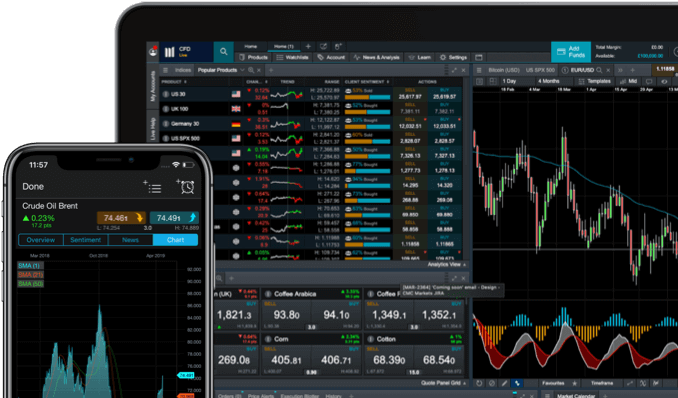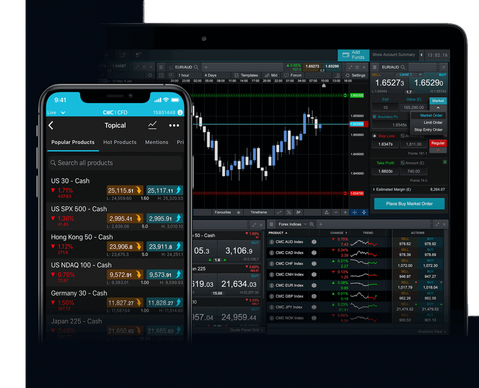Stock beta
Stock beta is a measure in fundamental analysis of how much a stock moves relative to an index, such as the S&P 500 or FTSE 100. The beta of a stock lets investors know how volatile a stock is. Shares that have larger price moves present increased profit potential, but the risk of getting caught in a large adverse price move may also increase.
In this article, we look at how beta works, how to calculate the beta of a stock, and how you can adapt trading and investing strategies based on beta in the share market, along with the risks. Beta is part of the Capital Asset Pricing Model (CAPM) which is a method for assessing risk versus returns in stocks and stock portfolios.
Stock beta meaning
A beta score for stocks helps assess how volatile a stock is relative to a major stock index. In this way, beta is a quick measure that traders can use to determine whether an asset is too risky for them, if the stock moves enough to meet their objectives, and how beta can also help in position sizing.
The index always has a beta of 1. A stock price that moves twice as much as the index will have a beta of 2. If the stock price only moves half as much as the index, then it will have a beta of 0.5.
A long-term investor or position trader may not wish to own volatile stocks. If they prefer stable companies that grow over time, they may decide to only invest in stocks with a beta value of near or under 1. On the other hand, a short-term trader such as a day or swing trader may only want to trade stocks that move a lot. They may look for stocks with betas of 2, 3, or higher, for example.
Position size may also be affected by beta. Since a low beta stock moves less than a high beta stock, theoretically, a person could invest more money into a lower beta stock and less money into a higher beta stock. A 5% upward move could have the same impact on the overall portfolio as a 10% upside move when there is twice as much capital in the 5% stock.
Beta measures a stock versus an index, so it is a comparative measure. In a volatile market, where both the stock and index are making big price moves, the beta value may not change much. But if a stock is volatile and the index is not, or the index is volatile and a stock is not, this may affect beta.
Alpha vs beta in the stock market
Beta is how much a stock price moves relative to the index, whereas alpha is excess return over and above index returns. For example, if the S&P 500 is up 10% over the past year and a stock is up 30%, the 20% difference represents alpha.
If a high beta stock fails to produce alpha, then the excess risk of the high beta stock isn’t justified by the returns. This affects your risk/reward ratio. For example, if a stock has a -5 alpha, which means that it underperformed the index by 5%, and a beta of 3, the investor may be taking on excessive risk (in the way of price movement) yet is not being compensated. They could have earned better returns by buying index funds with a beta of a 1 and collecting the extra 5% as well.
That said, alpha and beta are both backward-looking. They only show what the stock price has done relative to the index, but these figures do not provide information on what the asset may do in the future. If in the following year, the stock produces alpha or an excess return of 50%, then holding the higher beta stock would potentially be worth it because of the ultimate pay off.
High-alpha low-beta stocks
Upon understanding beta and alpha, it might be alluring to look for low-beta, high-alpha stocks. Quite often, this is a mathematical contradiction. If a stock significantly rises more than the index, this will create alpha, but it will also tend to increase beta.
How to calculate the beta value of a stock
To calculate the beta value of a stock, a spreadsheet program is useful for calculating the covariance of the stock and index returns, then dividing that by the variance of the index.
Beta = Covariance (Rs, RI) / Variance (RI)
Where:
Rs is the return of the stock
RI is the return of the index
Covariance is how the stock’s returns vary from market returns
Variance is the dispersion of market returns
If a stock returned 8% last year and the index returned 5%, a rough estimate of beta is: 8 / 5 = 1.6. This method only compares two data points. For more data points, running the covariance and variance in a spreadsheet such as Excel is recommended. There are also online beta calculators available and stock beta is often listed on financial websites, along with other information about the stock. This type of information is very important for investors when carrying out company analysis.
RI in the equation represents how much the index moves. Since the index is composed of many stocks, the variance of the index is called systematic risk. Even by investing in a large basket of stocks, such as an index or share basket, it is never possible to fully eliminate risk. There is still risk there, and it is given a beta of 1. Excess risk/movement increases beta, and lower movement decreases beta.
Open a demo account to practise spread betting or trading CFDs with £10,000 worth of virtual funds.
High beta stocks
A high beta value indicates that a stock moves more than the index and it is more volatile than the index or index funds. The beta value of stocks is neither good nor bad; it is purely information that traders and investors can use to determine if a stock is right for them. That said, many traders associate high beta with higher risks.
High beta stocks provide more movement than a stock with a beta between 0 and 1. A stock with a beta of 3 will move roughly three times as much as a stock with a beta of 1.
A high beta stock, assuming it also generates alpha, may outperform the market or index. Therefore, these types of stocks may be alluring to a swing trader or day trader looking to capture large price moves in a short period of time. These traders may not actually even be concerned with alpha, since they could trade long or short. Short-term traders tend to look more for movement and less for direction.
Traders may be interested in high beta stocks that also produce alpha. High beta without alpha increases the trading risk of their portfolio and they could produce better returns from stocks that do produce alpha. If they dislike risk and volatility, an index fund with a beta of 1 may be a better choice.
Trade on over 9,000 shares and ETFs with us
Low beta stocks
Low beta stocks usually have a beta below 1 and above zero. These stocks move less than the index over a given time period.
Traders who prefer less movement or volatility in their portfolio or positions may prefer low beta stocks. Less volatility typically brings lower returns, which may suit some investors, but for these seeking more price action, low beta stocks may not provide as much.
A trader or investor is not limited to picking either high or low beta stocks. A combination of high and low beta stocks will average out, resulting in a diversified portfolio with a beta somewhere in the middle of the stocks held. This approach could offer some more stable stocks (low beta), but also stocks that have the potential to produce bigger returns (high beta).
Negative beta stocks
It is also possible for beta to be negative. A negative beta means that the stock price tends to move in the opposite direction of the index or index fund. For example, a beta of -1 means that the stock price moves in the opposite direction and with a similar magnitude. If the index rises 5% and a stock tends to drop 5%, that stock would likely have a beta near -1. If the stock price tends to drop more than the index rises, then the beta will be below -1.
Negative beta stocks may provide some diversification to a portfolio since they don’t move in the same direction as most other stocks. While the stock may not do so well when the index is rising, if the index falls, negative beta stocks are likely to rise.
Beta trading strategies
Beta is useful for assessing how volatile a stock is, and the number can be incorporated into a variety of short and long-term trading strategies.
A momentum trader, for example, aims to capitalise on strong momentum. High momentum can occur in an index, index fund or even mutual fund, but higher momentum may be more likely to occur in higher beta stocks. As a baseline, a momentum trader may decide to only trade stocks with a beta of greater than 1.5, for example.
Traders attempting to capture volatility may also seek out higher beta stocks. They may pick a specific direction to trade in, or they may simply trade in the direction of which the price is currently moving. If a high beta stock suddenly becomes quiet, it may present an opportunity to enter a trade when the price breaks out of the quiet movement and larger price moves return. Investors may choose high or low beta stocks, or they may choose a combination.

What is the average beta?
An index, which is composed of many stocks, has a beta of 1. But, as discussed, a high or low beta is not good or bad in and of itself. High and low betas both have beneficial qualities that attract certain types of traders.
In a strict sense, average beta is the weighted average of all the betas in a stock portfolio. If a trader holds five stocks, each with an equal weighting in the portfolio, and the betas are 0.5, 1, 1.5, 2, and 2.3, then the average beta is 1.46. This is appropriate for a trader that is willing to accept slightly more movement than an index fund to possibly make a slightly higher return. However, this portfolio may not be acceptable to someone who is risk averse, and only wants to hold very low beta stocks, ideally with a value of under 1.
When taking multiple trades, the individual beta of each stock does not matter as much. The average beta of all the trades indicates the kind of volatility and movement that can be expected from that portfolio.
Investing in high or low beta stocks
It is possible to calculate the beta value of a stock using our Next Generation trading platform, which is explained in the steps below:
- From the Product Library, open a trading chart for your chosen index. Note the performance percentage over the past year.
- Then, open a trading chart for your chosen stock from the Product Library, and note its performance.
- Divide the stock’s performance by the index’s performance.
Open an account to start spread betting and trading CFDs on over 8,000 shares and 80 global indices.
Summary
Alpha and beta are tools that traders can use to assess how much a stock moves and how it performs. High and low-beta stocks both present risks. No matter what stock they are trading, traders can control their risk on each trade with stop-loss orders, which means that they will exit their positions if the price moves against them by a pre-determined amount. This ensures that no single unfortunate trade will destroy the total capital in their account. However, stop-loss orders are not always 100% successful and they do not take into account market slippage or gapping. Therefore, traders may wish to consider using a guaranteed stop-loss order if they want to ensure that their position is closed out at an exact price, regardless of market volatility.
Beta is just one tool of many that may be used to make trading decisions. Some traders and investors use it regularly, while other traders may not. Beta is purely information and it doesn’t tell us when to buy, sell or how to trade.

